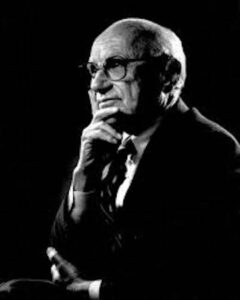
The Genius and Charisma of Milton Friedman
A Very Short Video Course That I Put Together
Economics is a subject that you should have at least a rudimentary understanding of if you want to speak intelligently about any political or social issues. If all the talk about the economy leading up to this year’s election has had your head spinning, the following video “mini-course” on Milton Friedman and his Nobel Prize-winning theory may be all you need.
1. Who was Milton Friedman?
Here’s a short cartoon from the Fraser Institute that provides a quick introduction to Friedman’s life and ideas.
2. An interview with Phil Donahue
Phil Donahue’s best quality as a talk show host was his earnest naïveté. He presented himself as a man that had a big heart but a modest brain. Here, he asks the questions any high school student might ask.
3. Who or what creates inflation?
In this short clip, Freidman refutes the most common misunderstandings about the origin of inflation. As he explains, it doesn’t come from greedy corporations or trade unions. They can’t create inflation because they can’t print dollars. Only the government, he says, can create inflation.
4. What about unemployment?
Friedman’s explanation of what creates unemployment and how, to some extent, it is inevitable, is a bit complex. You might want to listen to thisone twice.
5. Our “responsibility” to the poor
Freidman answers the difficult question of what responsibility the government has in eradicating poverty and helping the poor. His answer is not one that those in the poverty-solving business would like or agree with, but it is consistent with his larger economic theory. Click here.
6. What about welfare?
Along the same line as the previous clip, Friedman addresses another tough question. We all know that welfare tends to create dependency, but we surely cannot cut it off. So, what can we do? Click here.
7. Who serves the workers?
In this clip, we get into another sticky subject: the role of labor unions. Those that support the unions believe that without them businesses would take unfair advantage of their workers, especially minorities and poor people. Is that true?
8. Immigration: the pros and cons
A topic that is hot today. America prospered in its first several hundred years by having an open-border policy. Since 2020, the Biden administration has allowed at least 10 million foreigners to enter the US without vetting. As a free-market advocate, would Friedman think open borders make sense today? Click here and here.
9. The challenge with redistributing wealth
In this clip, Friedman argues that when governments take it upon themselves to redistribute wealth, the poor stay poor and everyone else gets poorer.
10. Free-Market Capitalism vs. Socialism
This clip rounds out your introduction to Milton Friedman’s economic theory with his rationale for why Socialism hasn’t worked and cannot work.
Beyond the Basics
If you’d like to learn more about Milton Friedman and free-market economics, here are some longer clips.
A Longish Conversation with Milton Friedman
This one is worth the time (a little more than an hour) it takes to watch it. For one thing, it shows Friedman’s humanity. It gives a sense of what it was for him and his fellow economists at the U of Chicago during his tenure as a teacher there, and how they fought to bring his economic theory to prominence.
In Depth with Milton Friedman
In this one (three hours long), Friedman talks about his life and work.
For even more, take a look at my review below of Milton Friedman: The Last Conservative by Jennifer Burns.







